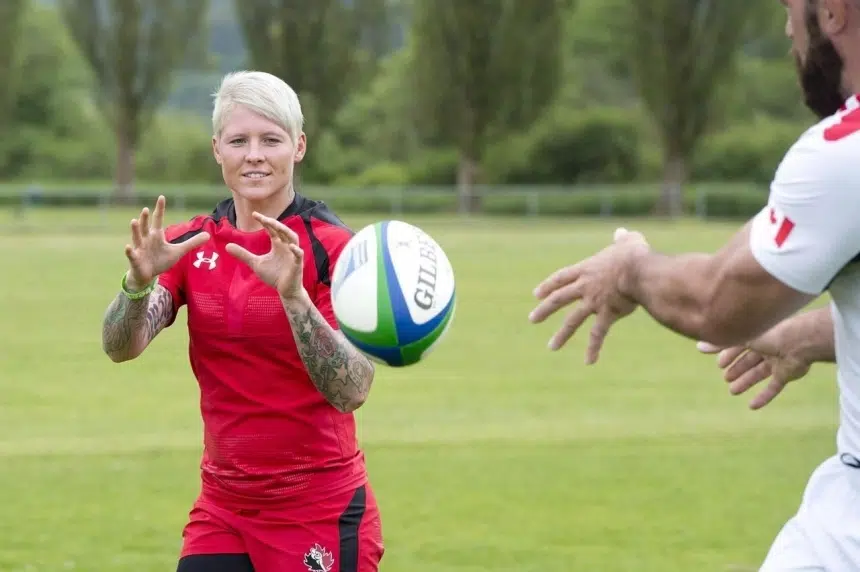At some point during the rugby sevens competition at the Rio Olympics, Canadian captain Jen Kish will look up in the stands.
She’ll be searching for her father.
“They’ll be 8,000, 10,000, 15,000 people in the stadium and I’m sure I’ll be able to pick him out,” said Kish. “He’s going to be that guy, in the middle of everything, and I’m really excited for him to experience that.”
Both have given their all to get to Brazil.
Kish has been putting her tattooed body on the line for her country for a decade. Her father has battled cancer.
Steve Kish, who worked two jobs to make ends meet for Kish and older brother Jason growing up, has been in remission for a couple of months. And while he is dealing with pain and side effects from chemotherapy, his daughter says “he’s still finding the positives in life.”
“I think this is a great distraction, for him to be able to go to the Games and experience the atmosphere,” said Jen.
Jason just had a child, so will be watching from Edmonton.
“They’re having a huge party. All my friends and family,” said his sister. “I think they’re putting a projector on the side of the house so the whole neighbourhood can watch, which is pretty freaking cool. I’m excited for everybody who gets to be part of this journey because that’s what I want, right. I want to share it.”
The 28-year-old from Edmonton does not have a relationship with her mother, however, and was shocked when she showed up out of the blue last summer in Toronto at the Pan American Games.
Kish was in the tunnel preparing to lead her team out at BMO Field when she saw her mother waving.
“I remember turning back to Kelly Russell, and I’m telling her ‘Oh my gosh, my mom is here.’ She’s like ‘What?’ And all my teammates know that I have no relationship with her, and she’s like ‘OK, immediately, let’s go through the game plan. What are we doing? Let’s refocus.’ And I was like ‘OK.’
“She got me refocused, but in the meantime while I’m playing, I’m looking out to the stands and she’s cheering, and she’s being the proud parent that she wasn’t really to me. She wasn’t a parent at all. And it was hard for me because my dad was unable to experience that, because he’s laying in a hospital, in ICU, trying to survive.
“So it was so hard, it was challenging. But I’m glad that it happened, because other Olympians always say —prepare for whatever, and the what ifs. And I know now that if something were to happen at the Olympic Games, that I would still be able to perform and lead my team the way that I can.”
Like her father, Kish looked for positives.
“The only thing I can control is my reaction to situations. And it was shocking, and after it really made me question a lot of things, and I had to work through a lot of things, but at the end of the day, it made me stronger and it put things in perspective for me.”
There has been no contact with her mother since.
Kish wears her heart on her sleeve. The rest of her inked body tells other stories.
One arm reads “Dance like no one is watching, Sing like no one is listening.” The other reads “Laugh like you’ve never been hurt, Live like it’s heaven on earth.”
Her biceps say “Live true” and “Love life.” Another design reads “What I do today is important.”
“I keep building off of my experiences so that’s how my tattoos keep growing,” she once said.
Kish adds other messages on her wrist tape every game
“I write ‘Ruck Cancer’ on my wrists in support of all those battling cancer who would love to play rugby, or who’d love to do something but can’t,” she said.
The five-foot-10 Kish is a force of nature on the rugby pitch, a rare combination of power and agility. Deceptively fast and freakishly athletic, she can rise gracefully in the air to pull down a restart or bowl over an opponent like a Mack truck.
She has paid the price. A knee injury kept her out of part of the 2014-15 World Series season and she had to wear a neck brace after her head was driven into French turf in the final stop of this season’s circuit.
Coach John Tait calls her one of the world’s best at the breakdown, where she makes a tackle and then contests the ball faster than almost anyone on the World Series.
In Rio, Kish is a woman on a mission. Just as Christine Sinclair and her soccer teammates inspired a nation with a bronze medal at the 2012 Games in London, Kish believes the Canadian rugby team can make a mark.
“I think when we go into Rio, and we’re playing on the biggest stage in the world, rugby in Canada is just going to explode . . . it’s not our national sport, because we come from winter, but I feel that there’s going to be just so much more interest and I just can’t wait for that moment, for rugby just to explode.”
Kish’s dream of being an elite athlete started at an early age.
In Grade 2, she had to create a book on what she wanted to do when she grew up.
“I put down professional athlete,” she said.
And in 1998, at the age of nine, she wept as she watched Canada win silver in the Olympic debut of women’s hockey.
“I knew right from there that’s what I wanted to do and that’s where I wanted to be.”
Her family could not afford hockey gear, however, so she fell into high school rugby.
She was good at it, jumping quickly from playing for Alberta to representing Canada at the under-19 level in the 15-player version of the game when she was just 16.
At 18, she was picked by the national team. A flanker and occasional No. 8, she played at the 2010 Rugby World Cup before getting injured.
After the tournament, Tait invited her to a sevens camp, setting her on a new rugby journey.
In Rio, Kish is hunting for the podium. The Canadians are medal threats, having finished third and second overall on the world circuit in recent years. But whatever happens, she will not let a medal define her.
“The mindset is ‘Go there, win a gold medal.’ I believe we’re capable of it. We’ve built the evidence over the years. We’ve beaten every team on the Series. So it’s a possibility. But to solely focus on that one thing to be what is success, it’s much broader than just a gold medal.”
—
Follow @NeilMDavidson and @Ewingsports on Twitter
Neil Davidson and Lori Ewing, The Canadian Press
©2016 The Canadian Press







